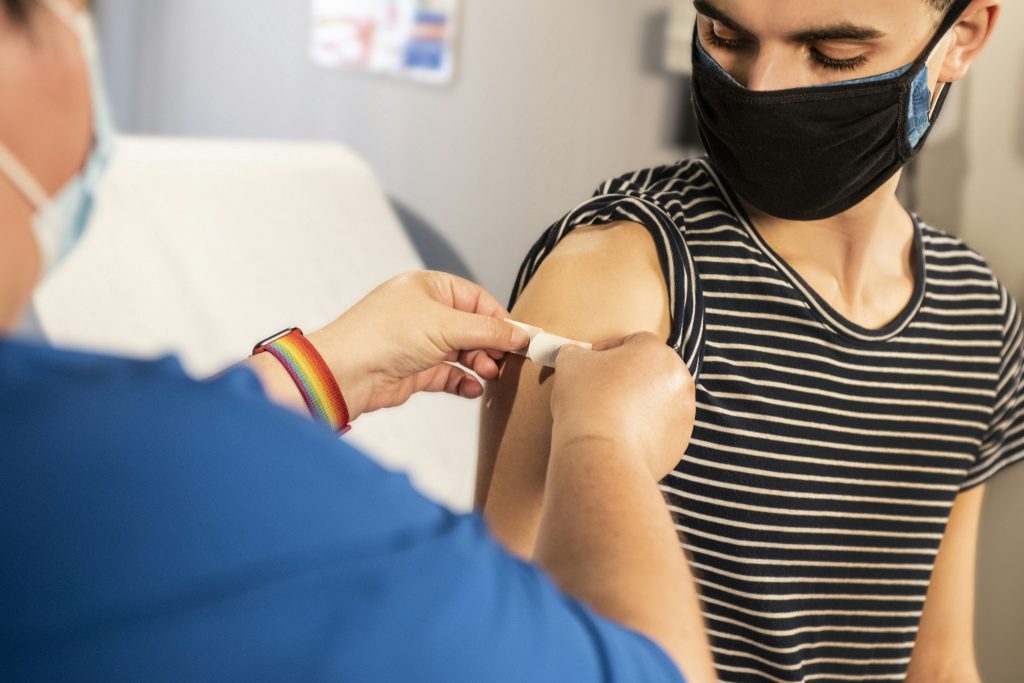Europeans facing vaccine hesitancy

Developed in record time thanks to the enormous financial, human and logistical resources committed, the first vaccines against Covid-19 may be marketed before the end of this year. The European Union has pre-ordered around two billion doses in total from several laboratories and the European Medicines Agency (EMA) hopes to be able to issue a favourable scientific opinion on the submitted candidate vaccines in the next few weeks.
The success of the vaccination campaigns rolled out by each of the Member States will depend on citizens’ willingness to have the vaccine. Yet various studies are showing that some Europeans do not intend, at least initially, to get vaccinated. They give a range of reasons for this reluctance, in particular the speed with which the vaccines were developed, overlooking the fact that the general interest must take precedence over individual reservations if we wish to achieve herd immunity.
Europe is far from exemplary when it comes to vaccination
Out of all the regions of the World Health Organisation (WHO), Europe (which is comprised of 53 States, of which 27 are EU Member States) is the region with the lowest mortality figures for children aged under five. No cases of polio have been recorded there since 2002 and many countries have halted the endemic spread of measles and rubella. Such success would not have been possible without vaccination programmes, which prevent the spread of many illnesses which affect the health, and also the prosperity and work capacity, of populations.
Several recent epidemics of vaccine-preventable diseases show, however, that the progress made is fragile, unequal and therefore insufficient to guarantee protection for all. From 2017 to 2019, the European Region experienced the worst measles epidemics in more than ten years, affecting almost all countries, including within the EU, and resulting in more than 100,000 cases in 2019. In 2019, the WHO identified “vaccine hesitancy” – the reluctance or refusal to vaccinate despite the availability of vaccines – as one of the top ten threats to global health.
According to French sociologist Jérémy Ward, this vaccine hesitancy covers a wide range of behaviours and attitudes, such as refusing some vaccines but accepting others, vaccinating one’s child later than is recommended, or having doubts and getting vaccinated despite them. This behaviour concerns a much larger population than the small minority who fully reject all forms of vaccination.
This distrust is more manifest in wealthier countries in general and is more prevalent in Europe than on other continents. The ramifications of this may be even greater in the fight against Covid-19 as concerns are expressed regarding the innovative nature of the techniques used and the speed with which the clinical trials were conducted. In the space of a few months, the first vaccines have been developed, whereas it usually takes twelve to fifteen years on average to obtain such results.
Mixed opinions towards vaccination within the EU
Concerned about the increasing number of measles cases, the European Commission published a special Eurobarometer survey in March 2019 on Europeans’ attitudes towards vaccination. Conducted in the 27 current EU Member States and the United Kingdom, it demonstrated that 85% of those polled believed that vaccines can be effective in preventing diseases such as measles, the flu, hepatitis, tetanus and polio.
Yet being convinced that a vaccine is effective does not always mean that a person believes vaccines to be safe. The survey highlights the many misconceptions which are circulating, to greater or lesser extents depending on the country. While more than 80% of people polled acknowledged that vaccination also protects others and that vaccines are rigorously tested before being authorised for use, almost one third are convinced that vaccines weaken the immune system (31%) or may cause diseases (38%) and almost one half (48%) criticise the risk of side-effects. The level of knowledge on vaccines appears to be highest in the most educated and wealthiest population groups and in people living in urban areas.
These figures conceal major differences between Member States: citizens in the Scandinavian countries (the Netherlands, Sweden, Denmark, Finland) emerge as the best informed, slightly ahead of Spain, while several Eastern European countries are lagging behind – including in terms of vaccination rates. Out of those people who do not want to get vaccinated, 10% on average state that vaccines are not safe. This figure reaches 15% in Belgium and in Latvia, and peaks at 22% in France.
France is the European champion of vaccine hesitancy
Around one third of French citizens believe that vaccines are not very safe or unsafe, placing the country among the most vaccine-sceptical countries in the world. Several recent events have had a lasting effect: the alleged link between autism and the MMR (Measles-Mumps-Rubella) vaccine, dispelled in many studies, the unconfirmed suspicion of a link between the hepatitis B vaccine and the development of multiple sclerosis, which in 1998 led health authorities to no longer recommend vaccinating adolescents as a precaution, and the major controversies surrounding the management of the H1N1 flu epidemic in 2009 and 2010.
“These events are the cause of a “cultural situation of distrust towards institutions and health authorities in particular”, specific to France, which may partly explain the greater prevalence of vaccine hesitancy compared to neighbouring countries”, notes a recent report by the French Senate. Endorsement of vaccination, which was excellent in the years from 2000 to 2005 (90%) fell abruptly in 2010 (60%) and has never regained the level of the 2000s (77% in 2017), despite a gradual recovery of immunization coverage since then.
A survey published in October by the Fondation Jean Jaurès also attributes France’s poor vaccination results to a crisis of confidence in the authorities and in public speaking, to which must now be added a distrust of the scientific community, fostered by the media jousting that some of its representatives have engaged in since the emergence of the coronavirus.
This attitude may extend the time it will take to get the pandemic under control and therefore to successfully bring about economic recovery in France. According to an Ipsos poll conducted in fifteen countries, only 54% of French citizens polled are willing to get vaccinated against Covid-19, placing the country at the bottom of the list. Those who refuse cite that the clinical trials moved too fast (35%), side-effects (32%), the lack of effectiveness (12%), while 13% claim to be against vaccines in general.
Immunization coverage varies among EU countries
The significant vaccine-preventable diseases recorded in recent years within the EU have highlighted persistent differences in terms of immunization coverage. As regards measles, diphtheria, tetanus and whooping cough, a 95% coverage rate is necessary to ensure protection for the entire community. This is not currently the case on an EU level.
According to the WHO’s figures for 2015-2016, published by the European Centre for Disease Prevention and Control, the population coverage for the second dose of the measles-containing vaccine was greater than 95% in some countries such as Spain, Portugal, Croatia, Hungary, Slovakia and Sweden, but lower than 84% in France, Italy and Romania. All Member States record rates over 84% for the first dose of the rubella vaccine but once again the figures vary, with countries like France and Italy under the 95% mark and Spain, Portugal and the Scandinavian countries above it.
Several reasons, which are significant to varying degrees depending on the country, can explain this situation. In addition to the factors explained above (distrust of science, public authorities or the pharmaceutical industry, a fear of potential side-effects, an under-estimation of the severity of vaccine-preventable diseases, distrust concerning the safety and effectiveness of vaccines), one difficulty lies in the differences in vaccination policies and schedules among EU countries. These differences, which may concern when vaccines are administered or the number of doses to administer, are often explained by social, economic and historical factors, or simply by the way in which healthcare systems are organised.
Some countries suffer from an addition problem of geographic access to vaccines and even a shortage of vaccines or financial or other issues related to research or production. These national differences come at a public health cost for the EU as a whole, as an insufficiently high immunization rate in one Member State endangers the health of all European citizens.
Misinformation (false or misleading information) in on-line media and social networks further complicates the distinction between scientific fact and unsubstantiated claims. The WHO has not hesitated to use the term “infodemic”, a trend which could compromise the roll-out of vaccination programmes.
This trend is of particular concern for Covid-19: the race for a vaccine has given rise to a proliferation of false information and rumours on social networks, particularly on Facebook and Instagram, which call into question the conditions under which the vaccines have been developed and even claim that the virus was artificially created by international organisations.
The European Commission, no competence but in the front line
Vaccination policies come under the jurisdiction of national authorities, yet the Commission assists EU Member States in the coordination of their strategies and programmes. In December 2018, the Council adopted a recommendation aimed at strengthening cooperation against vaccine-preventable diseases in the EU, with a threefold objective: to combat vaccine hesitancy and improve immunization coverage, to increase coordination for vaccine supply and to support research and innovation. EU countries are encouraged to draft and implement national vaccination plans including initiatives to improve immunization coverage.
The measures taken in recent years by different countries show the importance of planning customised strategies. This is what Denmark did in 2014. When the vaccination rates against the human papillomavirus started to fall following negative reports in the media, health authorities identified the reason behind this loss of trust. They subsequently worked with civil society groups to launch an information literacy campaign and contacted worried parents.
In another example, the surge in measles cases in Romania from 2017 to 2019 was unevenly distributed. A study observed differences in the way healthcare professionals talked to parents about vaccines and remedied this by improved training for these professionals in this field.
More generally, those who work in healthcare play a key role, even if they themselves may have reservations regarding vaccination, for themselves or their patients. It should also be stressed that in countries where vaccinations are done at school – in the UK and in Scandinavian countries-, there is trust and a high immunization coverage.
On 15 October, the Commission presented a communication in which it set out the elements that Member States must consider in their Covid-19 vaccination strategies (priority groups, clear communication on the advantages, risks and importance of vaccines, access). It also encourages them to insist on one point: the speed with which vaccines have been developed can be explained by the high level of investment made and technological advances and is not, as some fear, due to a lack of safety.
Future vaccination campaigns must not be limited to saying that the vaccines are safe and effective. They will also have to address the concerns and lack of understanding from part of the population and communicate clearly and in a transparent manner on how the vaccine works, the degree and duration of protection and on potential side-effects.
The major mistake would be to place on an equal footing conspiracy rumours and legitimate doubts, the categorical refusal of vaccination by staunch “antivax” believers and a legitimate need for information, without providing the answers that citizens need to hear.




